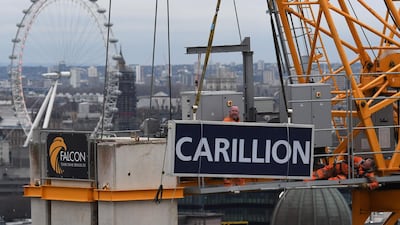The former bosses of Carillion, the British construction firm which collapsed last month, have blamed Qatar’s refusal to settle a £200 million bill for helping to push the company over the edge.
In a post-mortem on the firm’s failure in front of MPs on Tuesday, interim chief executive Keith Cochrane said Carillion has not been paid for an unnamed project in Qatar for 18 months.
Carillion’s largest contract in the Gulf region is a $500 million deal to develop downtown Doha ahead of the 2022 FIFA World Cup. The project is being overseen by Msheireb Properties, which is backed by the Qatar Foundation, an organisation that is itself backed by the country’s government.
Senior executives told MPs that they believe the company is owed £200 million for work it has completed in Qatar.
Mr Cochrane insisted that he “sought to achieve a settlement” on the payment. But he added that the ups and downs of negotiations ultimately failed.
Ex-boss Richard Howson, who headed the company from 2012 until July 2017, told the hearing that he had been retained by the firm in a lesser role to try and recover the money from the project.
Giving evidence to the committee, Mr Howson said he went to Qatar almost every month to try and persuade the client to settle the outstanding bill. “I felt like a bailiff, just to try and collect cash,” he said.
Mr Cochrane said Mr Howson had claimed at a board meeting in April 2017 that Qatar was going to pay up.
“Six weeks later the world had changed and it wasn’t paid.”
Carillion, which employed nearly 20,000 people in Britain, collapsed on January 15 when its banks halted funding, triggering Britain's biggest corporate demise in a decade and forcing the government to step in to guarantee public services from school meals to roadworks.
One of Carillion’s most problematic areas is believed to have been the Arabian Gulf, where it employs 19,000 workers. The company announced a massive £845 million write down last July, of which £314 million was attributed to its Middle East operations.
_______________
Read more:
UK's Carillion collapses as banks refuse to lend more money
Carillion collapse lays bare UK government contracting problems
Former executive ‘unearthed major problems at Carillion’
‘Business as usual’ in UAE despite liquidation of UK construction firm Carillion
_______________
Former finance director Zafar Khan admitted that a series of major contracts in the Middle East had been heavily delayed, dealing a blow to Carillion’s balance sheet. Brexit uncertainty and the snap general election in 2017 also hurt the business, he said, and meant that the firm was not being able to replace contracts coming to an end.
Mr Khan, who joined Carillion in 2011 as finance director for its Middle East and North Africa business, has been credited as the man who first unearthed the major problems facing the group.
He was promoted to group finance controller and then group financial director in January 2017. However, he was axed from the company nine months later after an internal review, launched under his watch, revealed the firm had spiralling levels of debt and led to its first profit warning last summer.
MPs probed further into Mr Khan’s role at the firm at the hearing on Tuesday, with one, Labour MP Peter Kyle, suggesting he was sacked for "shining a light" on Carillion’s problems.
Other MPs were less complimentary, however. In the first session of the inquiry, work and pensions committee chair Frank Field accused Mr Khan of being “asleep at the wheel” as the company’s debts mounted, its cashflow dried up and its pension deficit spiralled.
Mr Cochrane denied Mr Khan was sacked because he exposed Carillion's problems to the board, saying his departure was part of "wider management changes". Mr Khan, for his part, refused to "speculate" but acknowledged: "I spooked the board with results of the contract review".
He also denied he had been “asleep at the wheel”, saying: "I believe I did everything that I could have done essentially."
His replacement as finance director, Emma Mercer, who had held other finance roles at the group, said accounting had become more “aggressive” in the years before it collapsed but Mr Khan denied that there had been a concerted effort to take risk.
"I don't believe there were any instances of earnings manipulation... The numbers in the 2016 annual report were signed off by KPMG," he said.
Earlier in the hearing Mr Cochrane had apologised for the company's collapse.
"I'm truly sorry," he said. "It was the worst possible outcome. This was a business worth fighting for and that's certainly what I sought to do during my time as chief executive."
Responding to questions, Mr Cochrane said that net debt was too high at the end of 2016 and the company was trying to reduce it before it faced a deterioration of cash flow after March 2017.
The government is working to protect some jobs but 829 redundancies have already been made.

